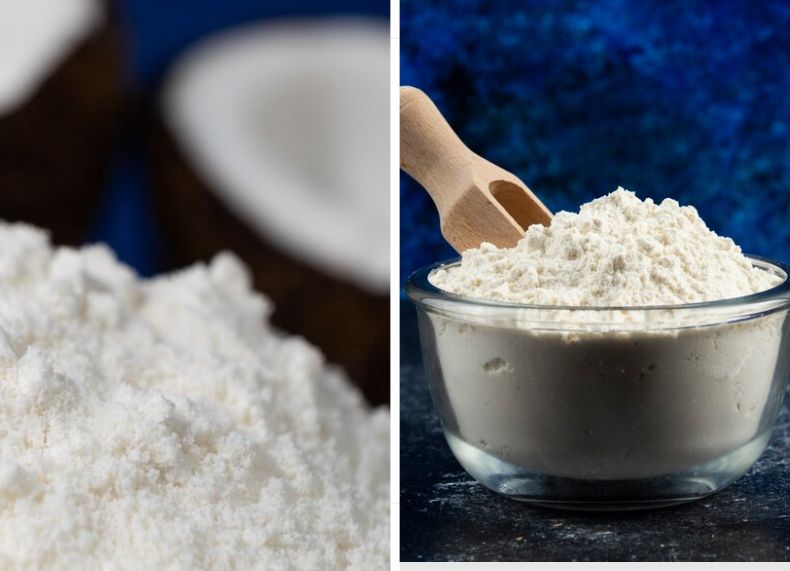Cassava flour vs coconut flour, discover their key differences, nutritional benefits, and best uses to choose the right flour for your needs.
If you’re exploring gluten-free or grain-free flour options, cassava flour and coconut flour are two you’ll come across.
Cassava flour comes from the whole cassava tuber, offering a neutral taste and a wheat-like texture, making it easy to use in baking, sauces, and flatbreads.
Coconut flour, made from dried coconut meat, is rich in fiber and absorbs more liquid, requiring adjustments in recipes. It has a mild coconut flavor that works well in desserts but may alter savory dishes.
If you’re aiming for a low-carb or high-fiber diet, coconut flour fits better. If you need a seamless wheat substitute, cassava flour is a good pick.
Knowing their differences helps you choose the right one for your needs.
Recommended: How to Produce Cassava Flour
Understanding Cassava Flour and Coconut Flour
Cassava flour is made from the whole cassava plant root, dried and ground into a fine, neutral-tasting powder resembling wheat flour.
It blends well into sweet and savory dishes, making it ideal for baking, thickening soups, and creating tortillas. However, its high carbohydrate content makes it unsuitable for low-carb diets.
Coconut flour, derived from dried coconut pulp, is light, fibrous, and highly absorbent, requiring extra liquid in recipes.
It has a mild coconut flavor that may influence dishes and works well in baking when paired with eggs or binding agents.
Lower in carbohydrates but rich in fiber, coconut flour is a popular choice for keto and low-carb diets, offering unique nutritional benefits compared to cassava flour.
Related: Recipe for Cassava Flour Pancake
Cassava Flour vs Coconut Flour: Nutritional Comparison
The nutritional profiles of cassava flour and coconut flour vary significantly, affecting their suitability for different diets.
| Nutrient (per 100g) | Cassava Flour | Coconut Flour |
|---|---|---|
| Calories | 330 kcal | 400 kcal |
| Carbohydrates | 78g | 60g |
| Fiber | 3.7g | 38g |
| Protein | 1.5g | 18g |
| Fat | 0.6g | 12g |
| Iron | 0.3mg | 5mg |
| Manganese | 0.1mg | 1.5mg |
| Potassium | 271mg | 770mg |
| Vitamin C | 20mg | 1mg |
Related: How Gluten-Free is Cassava Flour?
Key Takeaways from Nutritional Comparison:
- Carbohydrates: Cassava flour is much higher in carbs than coconut flour.
- Fiber: Coconut flour is a superior fiber source, promoting digestion and satiety.
- Protein: Coconut flour has significantly more protein, beneficial for muscle health.
- Fat: Coconut flour contains healthy fats, while cassava flour is nearly fat-free.
- Micronutrients: Cassava flour provides more vitamin C, while coconut flour is richer in iron and manganese.
Further Reading: Cassava Flour vs Tapioca Flour
Baking and Cooking Differences
Cassava and coconut flour behave differently in recipes due to their unique properties.
| Feature | Cassava Flour | Coconut Flour |
| Absorption | Absorbs liquid moderately | Highly absorbent, requires extra liquid |
| Binding | Holds structure well | Requires additional eggs or binding agents |
| Taste | Neutral, blends easily | Mildly sweet, coconut flavor |
| Texture | Soft, similar to wheat flour | Light but grainy |
| Best Used For | Breads, tortillas, thickening | Cakes, muffins, pancakes |
| Gluten-Free | Yes | Yes |
Further Reading: Is there Cyanide in Cassava Flour?
Key Takeaways for Baking and Cooking:
- Absorption: Coconut flour requires more moisture to prevent dryness.
- Binding: Extra eggs or binders are needed for coconut flour recipes.
- Taste: Coconut flour has a slightly sweet, coconut-like flavor, whereas cassava flour is neutral.
- Best Uses: Cassava flour is ideal for baking and cooking where a wheat-like texture is needed, while coconut flour works well in moist, dense baked goods.
Related: Comparing Cassava Flour and Regular Flour
Dietary Suitability of Cassava Flour and Coconut Flour
Choosing between cassava and coconut flour depends on your dietary needs and preferences.
| Diet Type | Cassava Flour | Coconut Flour |
| Gluten-Free | ✅ Yes | ✅ Yes |
| Low-Carb/Keto | ❌ No | ✅ Yes |
| Paleo | ✅ Yes | ✅ Yes |
| Vegan | ✅ Yes | ✅ Yes |
| High-Fiber | ❌ No | ✅ Yes |
| Easy Digestion | ✅ Yes | ❌ No (high fiber may be tough on digestion) |
Related: Cassava Flour vs Almond Flour
Key Takeaways for Dietary Suitability:
- Gluten-Free: Both flours are gluten-free.
- Low-Carb/Keto: Coconut flour is the better option due to its lower carb content.
- Paleo: Both are paleo-friendly, but cassava flour is more versatile.
- High-Fiber Needs: Coconut flour is ideal for those needing extra fiber.
- Digestive Sensitivity: Cassava flour is gentler on digestion, whereas coconut flour’s fiber may be too much for some people.
Also Read: Comparing Cassava Flour and All-purpose Flour
Which Flour Should You Choose?
Your choice between cassava and coconut flour depends on your dietary goals and the type of dish you’re preparing:
- Choose Cassava Flour if: You want a neutral-tasting flour that mimics wheat flour’s texture for easy substitutions.
- Choose Coconut Flour if: You follow a low-carb or high-fiber diet and don’t mind its unique flavor and absorbency.
Both flours have distinct benefits, making them excellent additions to a gluten-free or grain-free kitchen. Experiment with each to find which works best for your cooking and baking needs!
Related: Cassava Flour vs Wheat Flour
Conclusion
Your choice in cassava flour vs coconut flour comes down to what works best for your diet, taste, and cooking style.
Cassava flour behaves much like wheat flour, making it easy to use in baking and as a thickener. Coconut flour, with its high fiber and low-carb profile, fits well into gluten-free and keto-friendly recipes.
If you want a neutral flavor, go for cassava flour. If you prefer a hint of natural sweetness and extra fiber, coconut flour is the better pick.
Knowing their differences helps you create meals that match your health goals without compromising taste or texture.

Chimeremeze Emeh is a writer and researcher passionate about Africa’s most transformative root crop—cassava. Through his work at cassavavaluechain.com, he explores the entire cassava industry, from cultivation and processing to its diverse applications in food, health, and industrial use.
He also writes for palmoilpalm.com, where he shares his extensive experience and deep-rooted knowledge of palm oil, covering red palm oil, palm kernel oil, and refined products. His work there reflects his lifelong connection to agriculture and his commitment to promoting sustainable value chains in Africa.
Driven by curiosity and purpose, Chimeremeze aims to shed light on how cassava continues to empower communities, strengthen food systems, and link traditional farming wisdom with modern innovation.

